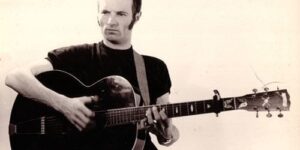
1971 was a tumultuous time for Michael Chapman. Following 1969’s great Rainmaker and 1970’s classic Fully Qualified Survivor, Chapman released Wrecked Again in 1971. It was his final record for EMI imprint Harvest Records, and also acts as a sort of hinge in Chapman’s career from folk-and blues-based early records to the more rock-oriented material that would come later.
So Wrecked Again–now reissued, like its two predecessors, by Light in the Attic–was initially released at a time of experimentation and breaking new ground for Chapman. The record takes on bigger horn and string sections, as Chapman often tries his hand at what he felt was a more Memphis sound. But for all that talk of wonder and experimentation, there was much doubt around Chapman at the time of this album. He hadn’t really made any money to date on his music, and Wrecked Again didn’t end up helping. Harvest didn’t like it, and the US tour that followed went disastrously. American audiences didn’t understand Chapman’s improvisational performance style, his manager abandoned him, and his touring mate–Rick Kemp–left the tour to run off with a woman he met. Chapman was mugged in New York and that was it for him. He threw in the towel.
These pending woes and the ones that predate them seem to inform Wrecked Again from the title on down. If the albums that precede it have titles that suggest agency (Rainmaker) and getting through on your own terms (Fully Qualified Survivor), things had changed and become something closer to resignation on Wrecked Again. The album opens with the playful instrumental “Polar Bear Fandango”, showing off Chapman’s impressive finger-picked guitar work. But “Indian Queens” is a distant, harrowing counterpoint. “They say” begins so many lines recounting the troubles of a particular woman, and the space between narrator and subject is palpable. “Is there any you or any me?” he pleads to know, and this kind of all-encompassing doubt doesn’t let up.
On the title track, Chapman is “trying to find my way to you”, but the way he drags the words out in his gravelly dank voice suggests he may be running out of steam. Later on in the record, “Back On Your Own Again” recounts a bad-luck guy who’s lost his friends through his own reckless living. If love and friendship isn’t fading (see also “The First Leaves of Autumn”), then physical places seem distant. There’s the long-lost “Fennario” and the final track “Riverboat Shuffle Farewell”, among others, that either avoid places or lament having to leave them behind. Chapman’s heart is heavy in these songs, that much is clear, but Wrecked Again does have a knack for changing mood at the right times. “All in All” may be down and out, but it’s self-deprecating and darkly funny. If “Fennario” sounds bitter, “Riverboat Shuffle Farewell” sounds bittersweet, sad but with just a hint of upbeat nostalgia. And, perhaps the finest song here, “Night Drive” is hushed and charming, an unabashed song of escape and love amid so many tales of abandonment and heartbreak.
There’s a bit of a trade-off at moments in the record, songs that feel too slick for Chapman’s murky view of the world. And it’s that murk, here and on other albums, that always separated Chapman from his contemporaries. Precise guitar phrasings and that honeyed rasp of a voice carving out holes we have to struggle to square with. Before he made rain and he survived. The best parts of this album retain that vital energy, while others feel unfortunately swapped out for new parts that are shiny, but don’t always run for long.
If Chapman seems in search of something here, the sounds he uses to try and find whatever it may be don’t always serve his purpose. The Memphis sound he strives for shows up in towering horns that ramp up the middle of “Wrecked Again”, or in the sleek strings on “The First Leaves of Autumn”, or the big swampy rock outro of “Fennario”. You can see the sinew that connects Chapman’s interests with that of Memphis music–the ties to folk and blues traditions–but these flourishes often shine so brightly they blot out the curious shadows of Chapman’s songs. They don’t quite match the tack piano and dust of “All in All” or the laid-bare guitar work of “Night Drive”. Wrecked Again is an often fascinating album of an artist in transition–in more ways than one–and one searching for new avenues not just for his art, but also for success.
